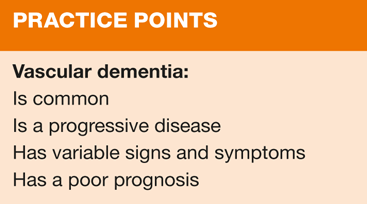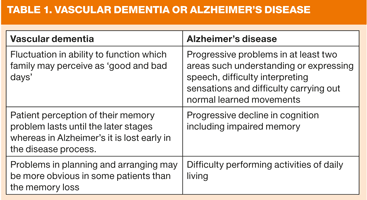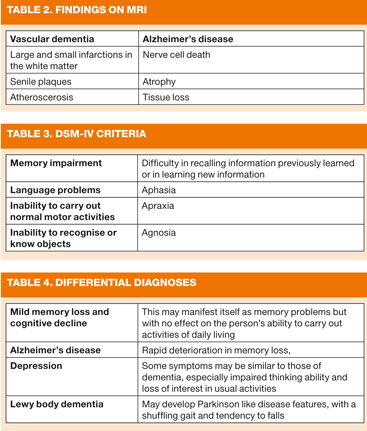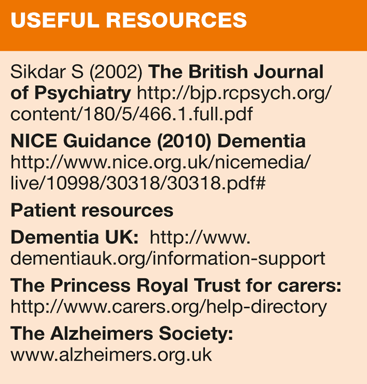A guide to vascular dementia
Margaret Perry RGN, BSc (Hons) MSc Advanced Clinical Practice
Margaret Perry RGN, BSc (Hons) MSc Advanced Clinical Practice
Advanced Nurse Practitioner, West Bromwich, West Midlands
Our ageing population means that most practice nurses are likely to encounter patients with dementia, and their carers
Dementia is a progressive disease that has a significant impact on the quality of life of the sufferer and a very distressing effect on friends and family. There are several forms of dementia, Alzheimer's disease being the most common, and vascular dementia the second most common form. The presentation of the condition is variable, although the term 'dementia' is widely used to describe a collection of symptoms ranging from memory impairment, a loss of communication skills and a gradual deterioration in the person's ability to carry out daily tasks and activities of living.1
Although dementia can affect people at any time of life, prevalence rates increase with increasing age. It is estimated that approximately one in five people over the age of 80 in the U.K suffer with dementia, while in those over 65, prevalence is estimated at one in twenty, which translates to around 700,000 people in the UK currently living with dementia of any type.1 In the US, prevalence rates are generally accepted to be around 20%, with individuals of African descent having a higher incidence of dementia than whites.2 One of the chief concerns is that with people living longer the numbers living with dementia is expected to increase dramatically in the years to come, increasing by 15% over the next 15 years and 45% over the next 45 years.1
RISK FACTORS
Vascular dementia and cerebrovascular disease share risk factors, including older age, hypertension, diabetes and cardiomyopathy. High levels of cholesterol are linked with increased cardiovascular risk but at present there is no clear established link to an increased risk of dementia.2 The evidence linking long term smoking to increased dementia risk has not been conclusive, however a multi ethnic study of midlife smokers who were followed for a mean period of 23 years found that more than two decades later there was more than a 100% increased risk of vascular dementia and Alzheimer's disease.3 The risk factors above are not specific to vascular dementia and are considered to be risk factors for all types of dementia. Unfortunately, despite the fact that some of these risk factors (such as smoking, obesity, and diabetes) can be modified, there is no direct evidence to suggest that doing so reduces the risk of developing dementia.4
SIGNS AND SYMPTOMS
Vascular dementia or Alzheimer's disease?
There is currently no gold standard for the clinical distinction between Alzheimer's disease and vascular dementia5 with often confusing similarities in the presentation of the two disorders. Mixed dementia can also occur, which arises when there is overlap between vascular dementia and Alzheimer's, with some studies suggesting that this occurs in 20-40% of cases.6 Because of the varied way in which the disease can manifest itself, onset may be abrupt and worsen quite quickly or the condition may progress more slowly over a period of many months. Signs and symptoms are shown in Table 1, alongside those of Alzheimer's. It is clear that there are overlapping characteristics between the two forms of dementia, which can occur alongside impairments associated with normal ageing.7
DIAGNOSIS
The initial consultation will gather information on:
- Medical history: This will include both past medical history and current information relating to the patients daily life and ability to perform daily activities, degree of memory loss and level of functional impairment. Often the support and presence of a close relative will be needed to get an accurate picture
- Blood tests may be requested as part of the screening process, to include assessment or detection of diabetes, cholesterol levels, thyroid function tests, full blood count and B12 and folate levels.
- Mental status assessment: The test commonly used is the Mini Mental State Examination (MMSE) which asks a series of questions, scoring one point for each correct answer up to a maximum of thirty points. The lower the score, the more severe the degree of mental impairment. However the test is not specific to any form of dementia, it simply confirms memory impairment. 8
- Depending on the information collected, an MRI scan may be requested to assess for any brain changes and prior evidence of brain changes arising from prior strokes. This may be useful in assisting the clinician to differentiate from Alzheimer's (see Table 2 for information on findings from MRI).
- Physical examination to assess for hypertension, vascular disease and other possible conditions, such as diabetes.
Further diagnostic tests
Determining the type of dementia can be difficult because the differences between vascular dementia and Alzheimer's disease are not always obvious.7 Mental health professionals may use the Diagnostic and Statistical Manual of Mental Health (DSM-IV) to aid diagnosis.9 (Table 3)
Types of vascular dementia
Vascular disease causes either focal or diffuse effects on the brain, but in many patients both types are observed together.10
- Acute onset: vascular dementia of this type may follow a stroke
- Multi infarct dementia: this type may follow a series of transient ischaemic attacks and tends to result in a sub-acute onset.
- Subcortical vascular dementia: this type affects the white matter in the inner parts of the brain. It ultimately affects the covering of nerve fibres and results in demyelination of nerve sheaths.
- Mixed dementia: this is an overlap between Alzheimer's disease and vascular dementia although there are no specific criteria to make a proper diagnosis.7
PATHOPHYSIOLOGY
The term vascular dementia is usually reserved for a subtly progressive worsening of memory and other cognitive functions that is presumed to be due to vascular disease within the brain.11 The link with cerebro-vascular disease arises from the progressive changes in the brain, often arising from the accumulation of cholesterol and other substances which lead to thickening and hardening of the arteries and reduced blood flow. The lack of oxygen which results from reduced blood flow eventually leads to the death of brain cells. In general, volume of tissue loss is a poor predictor of the severity of the cognitive impairment.2
DIFFERENTIAL DIAGNOSIS
Table 4 shows some of the differential diagnoses
QUALITY OF LIFE
Dementia of any form is obviously very distressing for all concerned and can result in a number of problems for the sufferer but also place a burden on friends and family who may become responsible for many aspects of care. NICE guidance groups problems into three areas: disabilitiy, health problems and social problems. 4
Disability
Problems with personal care and activities such as housework and personal care may become evident. This may progress to mobility problems, problems with hygiene and toileting and medication issues, possible non compliance as a result of memory loss.
Health problems
Poor nutrition linked with general self neglect and subsequent loss of weight may be apparent. Mobility problems may lead to risk of falls and injury with potentially serious consequences. Incontinence and confusion may worsen hygiene problems.
Problems incurred by the person are further confounded by the distress suffered by family members when they find themselves in a position of caring for their relative. According to NICE approximately one in three carers develop psychological problems such as depression.4 Specific characteristics linked to negative physical health effects on the part of the carer include lower socio economic status, older age and actually living with the person receiving care.12
PROGNOSIS
Vascular dementia affects each person differently and the speed of progression is highly variable from person to person. The prognosis for patients with vascular dementia is thought to be poor and worse than for those with Alzheimer's: the three-year survival rate in those over 85 years of age is 67%, compared with 42% in those with Alzheimer's disease.13 Survival rates following the onset of dementia have generally been suggested to be between five and nine years, however a Canadian study of 821 dementia sufferers however, found the median survival rate to be only 3.1 years,14 less than previously anticipated. For those patients who develop dementia after a stroke, the increase in mortality is significant with only 39% surviving for five years compared to 75% in age matched controls.10
TREATMENT AND PREVENTION
There is currently no recognised treatment for vascular dementia and much of the emphasis is placed on treating and managing risk factors such as diabetes, hypertension and hyperlipidaemia. There is also emphasis on keeping the affected person independent and helping them to stay in their own home for as long as patients. Recommendations for patient management include keeping a regular routine with social interaction and exercise within the person's capabilities, alongside carer support which is also essential.
FUTURE DEVELOPMENTS
There are several drugs currently under investigation although as of yet none has been found to have significant benefits and are as yet not licensed for use. One study found that the herbal medicine Gingko Biloba had some benefits in the cognitive and social functioning of some patients, however the researchers did not distinguish between the different types of dementia being studied and so it is unclear whether Gingko Biloba is an effective treatment for vascular dementia.15 Other areas for future research include the role of carers, physiotherapy input and speech therapy.
CONCLUSION
Dementia is clearly a condition with distressing consequences for all concerned. The current focus of attention is on attempts to improve patients' quality of life and outcomes. Earlier recognition and intervention is important and it is hoped that a better understanding of dementia will lead to earlier implementation of care packages and better use of resources.
REFERENCES
1. Alzheimer's Society. New research to reveal state of dementia. 2006. http://alzheimers.org.uk/site/scripts/press_article.php?pressReleaseID=99
2. Chawla J. Neurological manifestations of vascular dementia. Medscape 2010 http://emedicine.medscape.com/article/1135408-overview
3. Rusanen M, Kivipelto M, Quesenberry CP Jr, et al. Heavy Smoking in Midlife and Long-term Risk of Alzheimer Disease and Vascular Dementia. Arch Intern Med 2011;171: 333-339
4. Groves W.C Brandt J Steinberg M., Warren A., Rosenblatt A Baker A Lyketsos C.G (2000) Vascular dementia and Alzheimers: Is there a difference? A comparison of symptoms by disease duration. J Neuropsych Clin N 2000;12:305-315
5. Elias ME, Wolf P, D'Agostino RB. Untreated blood pressure level is inversely related to cognitive functioning: The Framingham Study. American J Epidemiol 1993;138:353-64
6. Levinoff EJ. Vascular Dementia and Alzheimer's Disease: Diagnosis and risk factors. Medscape, 2007. http://www.medscape.com/viewarticle/555220_1
7. The Alzheimer's Society. The Mini Mental State Test, 2011 http://alzheimers.org.uk/site/scripts/documents_info.php?documentID=121
8. American Psychiatric Association. Diagnostic and statistical manual of mental disorders 4th Edition. Washington DC; 1994
9. Alagiakrishnan K. Vascular Dementia. Medscape, 2011 http://emedicine.medscape.com/article/292105-overview#a0101
10. UCSF Memory and Aging Centre. Vascular Dementia. 2011 http://memory.ucsf.edu/education/diseases/vascularttp://www.nejm.org/doi/full/10.1056/NEJM200104123441501
11. National Collaborating Centre for Mental Health (2007) Dementia (full NICE guideline). The British Psychological Society & the Royal College of Psychiatrists. www.nice.org.uk
12. Wright LK, Clipp EC, George LK. Health consequences of caregiver stress, Medicine, Exercise Nutrition and Health 1993; 2:181-195
13. Skoog I, Nilsson L, Palmertz B, et al. (1993) A population based study of dementia in 85 year olds. N Engl J Med 1993;328:153-158
14. Wolfson C, Wolfson DB, Asgharian M, et al. A Re-evaluation of the Duration of Survival after the Onset of Dementia. N Engl J Med 2001;344:1111-1116.
15. Pasquier F. Treating vascular Dementia Journal of Quality Research in Dementia 2011;6 http://alzheimers.org.uk/site/scripts/documents_info.php?documentID=744&pageNumber=5
Related articles
View all Articles



